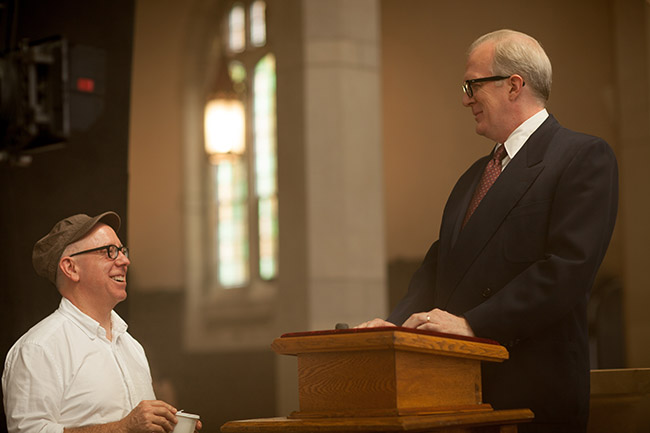I recently had the privilege of sitting down with James Schamus, an accomplished filmmaker and the director/writer of this weekend’s movie ‘Indignation.’ As I walked in to meet him, he was trying to figure out the hotel’s Keurig coffee maker to no avail, but his wisdom and artistic sensibility suggested an intelligence that reaches far past his capacity to brew coffee. His thoughts on Phoenix, Logan Lerman, the movies of today, and more were divulged during our short time together:
Ryan Bordow: Let’s get the obvious question out of the way: what do you think of Arizona during the summertime?
James Schamus: [Laughs] Well, I’m really pleased to be doing this interview indoors! I’ve spent a lot of time here: my sister and father live here in Phoenix, so I’m kind of a year-round visitor. I’m used to getting off the plane, putting your foot on the tarmac, and your shoe melting.
RB: [Laughs]
JS: So it’s not new to me at all. It’s changed a lot, hasn’t it, over the last 15 or 20 years? It certainly seems like things are much more lively now here.
RB: Just in the time I’ve been alive, things have picked up a bit.
JS: It’s probably because you were born. That’s what happened.
RB: Oh yeah! Certainly. I livened up the whole state. So, you’re a very accomplished writer — Ang Lee’s ‘Hulk’ and ‘Crouching Tiger, Hidden Dragon’; you produced ‘Brokeback Mountain’ — but I understand that Indignation is your directorial debut.
JS: Yeah.
RB: Does directing a film let you express the point you’re trying to make in a way that writing and producing hadn’t?
JS: A few things: one is, let’s hope I’m not trying to make a point when writing, producing, or directing. There’s a very famous phrase from an old Hollywood titan: “If I want to send a message I’ll use Western Union.” So on the one hand of course you have an overall — I guess what they call ‘vision’ or whatnot — but let’s not be too highfalutin about it. The great thing about all of these [filmmaking] jobs is that they’re problem-solving jobs, each in its own way. If you’re writing, you’re solving neurological and dramaturgical problems. When you’re producing, you’re solving logistical and financial problems. When you’re directing, you’re in one sense handcrafting, but every day is a thousand questions and you need to deliver a thousand answers. If you deliver 999 answers, then you’re unthreading the fabric and letting the vision lapse.
RB: That’s interesting. Thank you. For most people, the most recognizable name in Indignation is Logan Lerman. He’s undeniably a young talent — I believe he’s 24?
JS: Right.
RB: What was working with Logan like, and what does it signal to you about the new generation of actors?
JS: Logan has been working since he was 8, so he has more experience on set than I do. Kind of crazy right?
RB: Wow. Yeah.
JS: So he’s an old soul, but he’s a young rising star. I know one hears a lot in the press, and there’s a lot of moaning and groaning about millennials and work ethic and blah blah blah, but I didn’t see any of that on my set. Logan, Sarah Gadon — who plays Olivia Hutton— and that core of wonderful young actors were all spectacularly responsible, hardworking, thoughtful, you know. I didn’t see any attitude.
RB: Good to know they’re proving the stereotypes wrong. I thought the scene between Logan and the dean of the university was the standout scene of the film, [Logan] was chewing his dialogue so well.
JS: Yeah, it was kind of lunatic to try and make a movie that has as its centerpiece a lengthy and intense conversation. As you know, that’s not a normal American movie script. People definitely raised a few eyebrows when that scene came along.
RB: Speaking of the kind of movies we’re seeing nowadays: this year in particular has been, in my opinion, a very weak year for film. I like to think that it’s franchise fever: sequels and reboots and remakes that are mostly uninspired. What do you think is a way to remedy that?
JS: Well, the good news is that an easy way to remedy it is just don’t go see them. It’s good if you’re a student of cinema to see everything — you can learn as much from the movies you don’t like as the ones that you do — but for most people, vote with your feet. There’s probably some film in theater 17 that you may not have heard of that’s actually pretty cool. Arizona has the luxury of having a fairly healthy and burgeoning alternative film market. How long it lasts is up to you guys. Sometimes it’s the movies that aren’t being marketed to you that are the cool movies: my favorite movie so far this year is Zootopia.
RB: I loved Zootopia!
JS: I’m not exactly Zootopia’s target audience, and yet I chose to ignore the marketing machinery and just go see the movie. I saw a film that wasn’t supposed to be for me, and it was fantastic.
RB: Good advice. Lastly, what would your advice be for ASU students like me, such as film students who are looking to enter a business that can be unforgiving?
JS: The long haul is the haul. There is no, you know, short haul trip in this business. You could be forgiven for believing that because there’s always some flavor of the day — a recently discovered young success taking up a lot of airspace — but for most of the people I know who succeed, it took them a long time to get to where they were going.
RB: Thank you. Well, that was the last question I had.
JS: That was my last answer. I’m out of answers.
Facilitator: Did you get your coffee made?
JS: No, I couldn’t figure it out.




